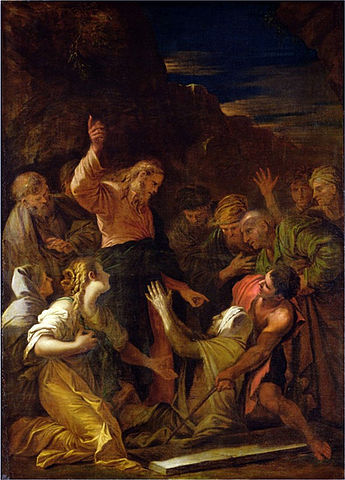ICCH Bulletin of February 11, 2024
February 11, 2024 Sixth Sunday in Ordinary Time
Welcome Father Bernward Today’s Readings: | Ps 32:1-2, 5, 11 | Mk 1:40-45

Today’s passage is in three sections:
- verses 40-41: Jesus heals a leper;
- verses 42-45a: Jesus protects his identity;
- verse 45b: the people still come to him.
As with last week’s passage, we are free to focus on one section alone or to see the three sections as a unit, one moving into the other.
[1] The healing of lepers is a feature of Jesus’ ministry - appropriately, since leprosy is a powerful symbol of the alienation which he came to free humanity from. In meditating on this passage, we are free to identify the particular form of leprosy we have experienced. We will then become freer to decide for ourselves who we want to identify with:
- the leper, the one who has been healed from uncleanness;
- Jesus, the one who brings the marginalized into the community.
The story is told imaginatively and every detail can touch us:
- the helplessness of the leper, “pleading on his knees”;
- the pathetic “if you want to” - the leper dares not put too much hope even in the one he knows can cure him;
- the immediate healing once he is touched.
Then there is the greatness of Jesus
- entering into the pain of the man (“feeling sorry for him,” as the Jerusalem Bible translation has it, does not fully convey the compassion for the man that Jesus feels in his heart);
- Jesus “stretching out” his hand, indicating that he must reach far out from where he is at present in order to meet the leper where he is;
- once the man has been touched the healing is immediate.
[2] This section introduces the theme of what scholars have termed “the messianic secret” - Jesus’ vain attempt to conceal his identity until the time is ripe. This messianic secret is related in all three synoptic gospels, but it is stressed most strongly in St Mark. Scholars have done extensive research to determine what was Jesus’ motive for insisting on the messianic secret. In lectio divina however, our approach is to start from our human experience. We ask ourselves questions like:
- what in our experience corresponds to the messianic secret?
- what does our experience teach us about why Jesus insisted on the messianic secret?
- how does the concept of the messianic secret help us to understand ourselves and the way we must live out our vocation in the world? This approach from experience reveals that all of us human beings have to work out for ourselves what is our God-given mission in the world, what we have to offer others that no one can do in our name. Like Jesus, we will find that we must struggle to preserve our “messianic secret.” We do not allow others to define our mission to them.
Our passage, if taken as a unit, brings out that those whom we have helped and who admire us are among the “others” we must resist. Our success with them can be an obstacle to our remaining faithful to our personal vision. They remind us that we have touched them but we learn from gospel passages like this one that it was a painful struggle for Jesus, as it is for us.
[3] Leaders who speak from their inner truth are very precious. Nowadays many leaders are content to make conventional statements - “this is what I am about”. What St Mark says of Jesus will be true of all those to whom we relate - we may be unpopular to them; it will seem very hard for them to reach us. These things don’t matter however - “even so, people from all around will come to us.”
This must also be what attracts people to the Church. It is not our business to make ourselves attractive. All the Church’s efforts must be devoted to being true to its vision. Often in history, the Church has gone along with the values of the world.
There were times when we accepted slavery, supported the imperialist ideology of the colonial powers, allowed ourselves to be protected by the armies of states. We thank God that in many parts of the world, in recent centuries, the Church has learned to keep its distance from these popular sayings - like Jesus we must learn to “stay outside where nobody lives.”
Source: Michel DeVerteuil, Lectio Divina with the Sunday Gospels Image: Christ cleansing a leper by Jean-Marie Melchior Doze, 1864
